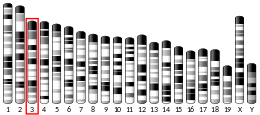SERPINI2
Serpin I2 is a protein that in humans is encoded by the SERPINI2 gene.[5][6]
Function
The protein encoded by this gene is a member of the serine protease inhibitor (serpin) superfamily made up of proteins which play central roles in the regulation of a wide variety of physiological processes, including coagulation, fibrinolysis, development, malignancy and inflammation. The gene product may have a role in a growth-control, possibly growth-suppressing pathway and, when impaired, may be involved in pancreatic carcinogenesis. The protein is a member of the plasminogen activator inhibitor-1 family, a subset of the serpin superfamily whose members act as tissue-specific tPA inhibitors. Two alternatively spliced transcript variants encoding distinct protein isoforms have been found for this gene.[6]
References
- 1 2 3 GRCh38: Ensembl release 89: ENSG00000114204 - Ensembl, May 2017
- 1 2 3 GRCm38: Ensembl release 89: ENSMUSG00000034139 - Ensembl, May 2017
- ↑ "Human PubMed Reference:".
- ↑ "Mouse PubMed Reference:".
- ↑ Ozaki K, Nagata M, Suzuki M, Fujiwara T, Miyoshi Y, Ishikawa O, Ohigashi H, Imaoka S, Takahashi E, Nakamura Y (July 1998). "Isolation and characterization of a novel human pancreas-specific gene, pancpin, that is down-regulated in pancreatic cancer cells". Genes, Chromosomes & Cancer. 22 (3): 179–85. PMID 9624529. doi:10.1002/(SICI)1098-2264(199807)22:3<179::AID-GCC3>3.0.CO;2-T.
- 1 2 "Entrez Gene: SERPINI2 serpin peptidase inhibitor, clade I (pancpin), member 2".
Further reading
- Maruyama K, Sugano S (January 1994). "Oligo-capping: a simple method to replace the cap structure of eukaryotic mRNAs with oligoribonucleotides". Gene. 138 (1-2): 171–4. PMID 8125298. doi:10.1016/0378-1119(94)90802-8.
- Suzuki Y, Yoshitomo-Nakagawa K, Maruyama K, Suyama A, Sugano S (October 1997). "Construction and characterization of a full length-enriched and a 5'-end-enriched cDNA library". Gene. 200 (1-2): 149–56. PMID 9373149. doi:10.1016/S0378-1119(97)00411-3.
- Xiao G, Liu YE, Gentz R, Sang QA, Ni J, Goldberg ID, Shi YE (March 1999). "Suppression of breast cancer growth and metastasis by a serpin myoepithelium-derived serine proteinase inhibitor expressed in the mammary myoepithelial cells". Proceedings of the National Academy of Sciences of the United States of America. 96 (7): 3700–5. PMC 22357
 . PMID 10097100. doi:10.1073/pnas.96.7.3700.
. PMID 10097100. doi:10.1073/pnas.96.7.3700. - Chang WS, Chang NT, Lin SC, Wu CW, Wu FY (November 2000). "Tissue-specific cancer-related serpin gene cluster at human chromosome band 3q26". Genes, Chromosomes & Cancer. 29 (3): 240–55. PMID 10992299. doi:10.1002/1098-2264(2000)9999:9999<::AID-GCC1029>3.0.CO;2-A.
- Rual JF, Venkatesan K, Hao T, Hirozane-Kishikawa T, Dricot A, Li N, Berriz GF, Gibbons FD, Dreze M, Ayivi-Guedehoussou N, Klitgord N, Simon C, Boxem M, Milstein S, Rosenberg J, Goldberg DS, Zhang LV, Wong SL, Franklin G, Li S, Albala JS, Lim J, Fraughton C, Llamosas E, Cevik S, Bex C, Lamesch P, Sikorski RS, Vandenhaute J, Zoghbi HY, Smolyar A, Bosak S, Sequerra R, Doucette-Stamm L, Cusick ME, Hill DE, Roth FP, Vidal M (October 2005). "Towards a proteome-scale map of the human protein-protein interaction network". Nature. 437 (7062): 1173–8. PMID 16189514. doi:10.1038/nature04209.
- Lim J, Hao T, Shaw C, Patel AJ, Szabó G, Rual JF, Fisk CJ, Li N, Smolyar A, Hill DE, Barabási AL, Vidal M, Zoghbi HY (May 2006). "A protein-protein interaction network for human inherited ataxias and disorders of Purkinje cell degeneration". Cell. 125 (4): 801–14. PMID 16713569. doi:10.1016/j.cell.2006.03.032.




